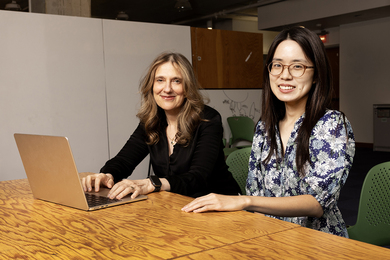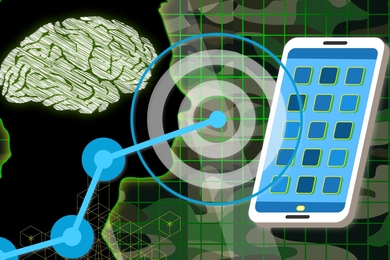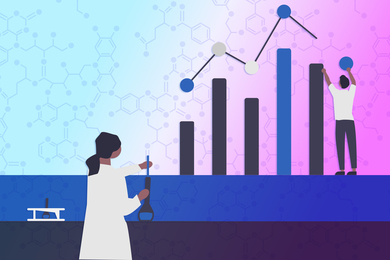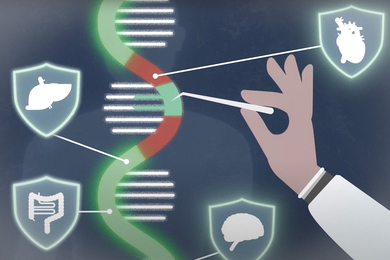Top 10 AI News
MIT researchers develop AI tool to improve flu vaccine strain selection

Researchers at MIT created VaxSeer, an AI-driven tool that predicts influenza virus evolution and antigenicity. The goal is to improve the accuracy of flu vaccine strain selection and reduce guesswork in the process.
Simpler models can outperform deep learning at climate prediction

New MIT research finds that traditional climate models, which capture natural variability, can outperform deep learning approaches when predicting local temperature and rainfall. The result highlights limitations in AI’s ability to model complex, low-signal climate data.
New technologies tackle brain health assessment for the military

MIT’s Lincoln Laboratory is applying AI and rapid screening tools to assess brain health in soldiers. The new technologies, building on years of research, enable quick detection of brain injuries in the field, with potential applications in sports and civilian medical settings as well.
Can large language models figure out the real world?

MIT researchers propose a new test to assess whether AI systems that excel in one domain can transfer their knowledge to another. The work explores if language models truly understand the underlying concepts enough to apply them in real-world scenarios.
A new model predicts how molecules will dissolve in different solvents

MIT scientists developed a computational model to predict molecule solubility in various solvents. This tool could accelerate drug design by choosing safe solvents and reducing hazardous material use, potentially streamlining pharmaceutical research.
Researchers glimpse the inner workings of protein language models

A new analytical approach from MIT reveals how AI models predict protein sequences that could be good drug or vaccine targets. By studying the internal features used by “protein language” models, researchers can better understand how these systems identify promising biological structures.
How AI could speed the development of RNA vaccines and other RNA therapies

MIT engineers applied machine learning to design nanoparticles that deliver RNA into cells more efficiently. This AI-guided approach could accelerate the creation of new RNA-based vaccines and therapies by optimizing delivery methods at a speed far beyond trial-and-error.
Using generative AI, researchers design compounds that can kill drug-resistant bacteria

A team at MIT used two AI techniques to design novel antibiotic compounds. One AI-generated molecule showed promise against MRSA (methicillin-resistant Staphylococcus aureus), pointing to a new way of discovering drugs that outmaneuver bacterial resistance.
A new way to test how well AI systems classify text

Researchers at MIT devised a novel method to evaluate language models that categorize text. As AI models increasingly affect everyday life, this testing framework offers a way to check their reliability and catch mistakes where misclassification can cause harm.
MIT gears up to transform manufacturing

MIT has launched the Initiative for New Manufacturing, bringing together experts from across the Institute to drive a major transformation in production. The program aims to leverage AI, automation, and new engineering processes to advance U.S. manufacturing capabilities.
How To Build An Emotionally Intelligent Team With AI
AI can support team development by handling routine tasks, allowing teams to focus on interpersonal dynamics. Aytekin Tank outlines strategies for leaders to incorporate AI tools in ways that enhance emotional intelligence and collaboration at work.
MIT Finds 95% Of GenAI Pilots Fail Because Companies Avoid Friction
An MIT study reports that 95% of generative AI pilot projects fail, largely because organizations remove the challenges (or “friction”) needed to properly integrate AI solutions. Jason Snyder discusses how embracing some complexity is critical for successful AI adoption.
Women Who Use AI At Work Face A Predictable ‘Competence Penalty’
Michelle Travis highlights research showing that women using AI tools at work can face a bias penalty, with colleagues perceiving them as less competent. The article examines the gender dynamics in AI adoption and calls for awareness of these prejudices.
Why Nvidia Earnings Matter More To Markets Than What The Fed Chair Said
Peter Cohan argues that Nvidia’s latest earnings report had a bigger impact on financial markets than recent Fed statements. As a leading AI chipmaker, Nvidia’s strong growth is seen as a bellwether for tech and AI investments, outweighing monetary policy news.
The New Plaud Note Pro Is An Advanced AI Note Taker Designed For Meetings, Calls Or Dreams

Mark Sparrow reviews the Plaud Note Pro, a pocket-sized AI device that records and transcribes meetings and conversations. Using advanced speech recognition, it can summarize discussions, offering a hands-free way for professionals to capture important points.
AI Kills Jobs, Stanford Study Finds, Especially For Young People

John Koetsier reports on new research from Stanford University indicating that AI adoption tends to reduce job opportunities, a trend particularly strong among younger workers. The study fuels debate on how to balance technological progress with employment impacts.
VCF And Private AI Take Center Stage At VMware Explore 2025

Patrick Moorhead and Matt Kimball describe highlights from VMware’s Explore 2025 conference, where discussions focused on VMware Cloud Foundation (VCF) and private AI deployments. They note how businesses are planning to run AI workloads securely on private clouds and hybrid environments.
Nvidia Jetson AGX Thor Dev Kit Raises The Robotics Bar With Blackwell

Dave Altavilla reviews Nvidia’s new Jetson AGX Thor development kit, powered by the Blackwell AI architecture. The high-performance board is designed for robotics and edge AI applications, offering unprecedented processing power for autonomous systems and IoT devices.
AI Can Read Your Thoughts — The Future Of Brain-Computer Interfaces

Jason Snyder explores advances in brain-computer interfaces (BCIs), noting a recent AI achievement: decoding inner speech (subvocal thoughts) with 74% accuracy. The article highlights the potential and ethical concerns of AI-driven mind-reading technology.
The AI Agent Economy: Five Strategies To Create Value And Transform Industries
Sahar Hashmi outlines five ways businesses can harness AI agents to drive innovation: assess AI suitability in processes, leverage quality data, manage risks, measure performance, and plan adoption. She argues that autonomous AI workflows are reshaping industries worldwide.
The success of AI music creators sparks debate on future of music industry

British AI music creator Oliver McCann, who lacks formal music training, has generated millions of streams using AI to produce songs in various genres. The AP story explores how AI-generated artists like McCann are challenging the traditional music industry and raising questions about creativity.
AI-enhanced ‘The Wizard of Oz’ premieres at Las Vegas’ Sphere

An AI-enhanced version of the classic film “The Wizard of Oz” made its debut at the new Sphere theater in Las Vegas. Using advanced graphics and projection, the movie has been reimagined to exploit the venue’s immersive capabilities. The event has audiences speculating on what other pop culture experiences may get the AI treatment.
Book authors settle copyright lawsuit with AI company Anthropic

A class-action lawsuit by book authors against AI developer Anthropic has been settled. The authors had accused Anthropic of using their copyrighted books to train its AI models without permission. Details of the settlement were not disclosed, but the deal resolves a high-profile test of copyright law in the AI era.
Melania Trump invites K-12 students to participate in nationwide AI challenge contest

Former First Lady Melania Trump announced a national AI-themed contest for K-12 students, encouraging young people to learn about artificial intelligence. The initiative invites participants to design AI solutions to benefit society, such as apps for teaching or community health, blending creativity with technology education.
Study says AI chatbots need to fix suicide response, as family sues over ChatGPT role in boy’s death

A recent study finds that leading AI chatbots (like ChatGPT, Claude, and Gemini) may provide inadequate or unsafe responses when users express suicidal intent. In a related case, a family has sued OpenAI, claiming that guidance from ChatGPT contributed to their teenage son’s death. The research and lawsuit highlight urgent concerns about how AI handles mental health queries.
Elon Musk accuses Apple and OpenAI of stifling AI competition in antitrust lawsuit

Elon Musk filed an antitrust lawsuit against Apple and OpenAI, alleging that they are hindering competition in AI. Musk contends that Apple’s App Store policies and OpenAI’s business practices unfairly block rival AI voice assistants and limit consumer choice.
As AI becomes part of everyday life, it brings a hidden climate cost

The proliferation of AI-driven services has a significant, often-overlooked environmental impact. Data centers running AI consume vast amounts of energy. Reporters note that as every company races to deploy AI, the hidden carbon footprint of massive computing and infrastructure expansion could slow progress on climate goals.
Google’s Pixel 10 phones raises the ante on artificial intelligence

Google’s new Pixel 10 and Pixel 10 Pro phones come packed with AI features, including advanced camera tools and voice assistant improvements. The phones aim to make AI assistance seamless in everyday tasks like photography and scheduling, indicating how smartphones are becoming smarter with each generation.
Wall Street steadies after Nvidia, Palantir and other AI stars trim their losses

U.S. stock markets recovered some ground after earlier declines, as major AI-related stocks like Nvidia and Palantir cut their losses. Investors pointed to overall technology sector resilience and dampened concerns about economic headwinds, helping to stabilize trading.
Australian lawyer apologizes for AI-generated errors in murder case
An Australian defense attorney admitted that he inadvertently submitted fabricated information created by AI during a murder trial. The incident led to an official apology and scrutiny over the use of artificial intelligence tools in legal proceedings, highlighting the risks of unverified AI output in critical contexts.
